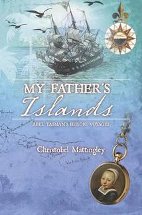My father's islands: Abel Tasman's heroic voyages by Christobel Mattingley

National Library of Australia, 2012. ISBN 9780642277367.
(Ages: 10+) Historical. Highly recommended. Craesjen introduces
herself from the start, a strong minded, chatty young girl,
continually asking questions of her seafaring father, Abel Tasman,
especially when he arrives home after months at sea, bringing with
him the scent of spices and many, many tales. In this wonderful
recreation of the story of this early explorer and his amazing
discoveries, Christobel Mattingley has taken on the voice of his
daughter, a girl who loves her father, despite his being at sea for
so long.
Working for the Dutch East India Company means taking on an array of
things, chasing pirates, catching smugglers, charting unknown waters
and islands, searching for any new goods which could be sold at high
profits back in Europe and carrying cargo back to be sold. Made
captain, his abilities are recognised and he is commissioned to
explore the seas north of Indonesia, the Dutch East Indies, and
later given the command of two ships, the Zeehaan and the Heenskerck
o find new goods and things to trade.
This fictionalised biography of Tasman never falters. We hear of his
exploits and courage, his daring and expeditions through the eyes of
his daughter, and so are given an easily digested version of his
life and discoveries. What might have been ponderous is exciting and
visual, told with a child's perspective, and the inclusion of many
maps and drawings from the draughtsman on this voyage in 1642 add to
the fascination of Tasman's life.
There has been a number of excellent fictionalised biographies of
late, the wonderful Taj and the great camel trek by Roanne
Hawke, giving the exploits of Giles' expedition across the Nullarbor,
and Anthony Hill's absorbing recreation of Cook's voyages in Captain
Cook's apprentice.With the Australian Curriculum's history
focus, students are well served with these books, and My
father's islands will be the icing on the cake for those
studying Australia's early exploration. Having been taught that
Tasman was one of our foremost early explorers, paving the way for
Cook and others to discover more of our shorelines and so
precipitate the settlement of Australia by Europeans, to read that
Tasman was dismissed as not courageous enough by his masters in
Batavia, was shocking. I hope that younger readers who read this
book will be equally disturbed by the reception this great man
received, after reading this engrossing account of his life and
achievements.
Fran Knight